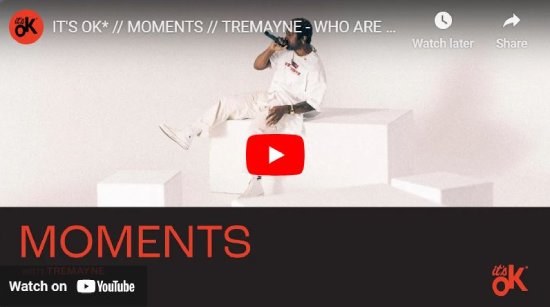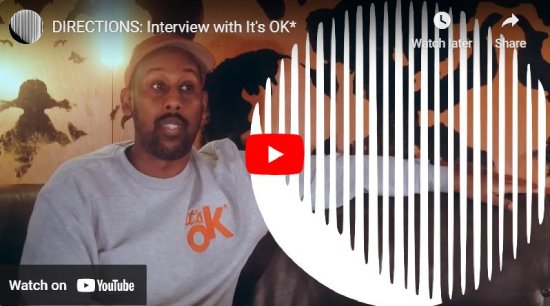When we speak to Said Yassin, cultural programmer and founding member of Toronto’s DIY charitable party event institutions, Dudebox and It’s Ok* – a multi-genre, intimate concert series – he’s a bit frazzled.
He’s just come off of the all-night Toronto arts event Nuit Blanche, squeezing our interview in days later. Now, he’s just realized that the deadline for a grant application he’s preparing is due a couple of hours earlier than anticipated. For Yassin, who splits his time between It’s Ok* and his role as the Manager of Concerts & Special Projects, Performing Arts Division, at The Royal Conservatory of Music – co-ordinating concert dates, contracts, and liaising with artists – the proverbial “wearing many hats” is just the reality of his day-to-day life.
It’s Ok*, established in 2019, relies on a dedicated volunteer staff of five, who are paid for events, and an equally committed community of members always up to help, whether that’s setting up and taking down event spaces or putting up posters. Nonetheless, Yassin is the touchpoint.
“Every hour that I’m not physically doing something, I’m trying to plan for the future,” he says. “Thinking about new programs, innovative programming, working on admin. We’re not at a point yet where we have a ton of staff, so the bulk of grant writing, financial management, accounting, falls on my plate. So, it’s pretty full-on, all of the time.
“I feel like I know a little bit about a lot of things,” says Yassin with a laugh, when asked what skills he’s had to deploy to succeed in these ever-shifting roles. “I’ve always been really good at putting things in their own bucket and not blurring lines: if I’m working on getting our windows repaired, or preparing our HVAC, I can tap into that brain. Or if I’m programming, I’m there. So, [it’s about] compartmentalizing; being able to work on a lot of things simultaneously.”
Yassin has a B.A. in Political Science and Government from Ryerson University (now Toronto Metropolitan University), and took a not-for-profit Arts Management course at Humber College. Both, he’s happy to say, are “coming back around” in his current roles – especially staying abreast of what’s happening in the city politically. However, surprisingly, it’s the time he spent working in restaurants, and the skills developed there, that now serve him most.
“[It’s about] being really organized and having systems and structures,” he says. “I worked in the restaurant industry for a long time as a cook, and dinner service is dinner service, it’s coming no matter if you’re ready or not, [which requires] being able to organize yourself in a way that you’re going to be successful when that time comes. The tasks are not roasting or blanching, but the same principles cross over. I would never have imagined how much I would reference my time working in restaurants.”
______________________________
The life of a cultural and community planner is a natural extension for Yassin. “I started working in the arts and non-profit sector in 2014, but I feel I’ve been bringing people together for most of my life,” he says. “My parents’ [home] was the house that people were always coming to. Through my high school and university years, I think I was the same.”
A love for music, arts, and culture; a keen eye for culturally relevant shifts; and a knack for bringing innovative artists and events to the people, have guided his career. But it was also the challenges and “disrespect” he experienced attending events and working in white-dominated venues that lit his desire to help create culturally inclusive spaces from the ground up.

Select the image to play the It’s Ok* Moments YouTube video of Tremayne performing the song “Who Are You / A.P.O.W.N.”
“I don’t know if I’ve ever had a good feeling working with a venue,” he says. “It always [felt] as if I had to prove myself, sell myself, bend over backwards to put the venue owner or manager’s mind at ease… That kind of pushed me into, ‘I gotta figure this out on my own, otherwise I’m not going to be able to do this.’ You can only take so much,” he says with a weary chuckle.
Finding himself in the burgeoning role of community leader, Yassin is tapping into internal resources he never anticipated. And notes that while he has a small network of support that he can reach out to for guidance, leading an organization comes with inevitable isolation. “For a lot of it, I’m kind of on my own to internalize and take things on the chin’” he says. “I also have to get out of my own shoes, and step back, and reflect and [acknowledge] that I’m doing the best that I can with what I have.
“I’ve mostly been self-taught. I had a collective in university called Dudebox, where we’d throw these big parties in non-traditional venues, and I kind of had to just teach myself about what to do and what not to do, and learn and grow from there. So now, having this space, what excites me is seeing folks who look like me, who have an idea, and being able to support them through that idea, and help them move into the next stage of their career.
“We’re a really small organization that’s ballooned into a gigantic organization, now that we have this physical space.”
Yassin notes that one inevitable challenge of his roles is having to say no. “There’s only so many hours in a day and so many days in a year,” he says. “There’s lots of things that come across my plate that I’d like to support, but not being able to find a day in the calendar – it makes me feel terrible.”
______________________________
The next steps for It’s Ok* are plenty, including upcoming series such as the Learning Together workshop, and Artists in Conversation, as well as 2025’s edition (the third) of the It’s Ok* festival. The sky’s the limit for this passionate organization.
“Since I’ve started It’s Ok*, we haven’t taken a step backwards, even during the pandemic,” says Yassin. “We pushed on and we pivoted as everyone did, but we were still in a better place than the year before. The responsibility is real, the accountability is real, and it’s about managing through that. But there’s nothing that I would rather do.”
